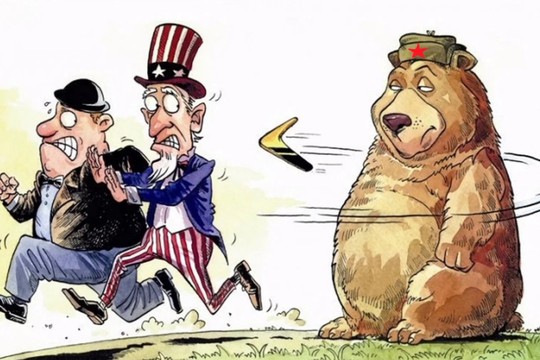Pic.: e-news.su
“I’ve taught a seminar on financial warfare at the U.S. Army War College for the past seven years. I usually have about 12 students from all branches (Army, Navy, Marines, Air Force, and Coast Guard) as well as civilians from the State Department, CIA and other agencies. They’re generally mid-career, about 35-years old. Some are older, with the rank of Lt. Colonel, Commander, or fighter pilot.
My 2022 seminar was the most interesting so far because I told the students that after six years of studying hypothetical financial wars… we finally had a real war to discuss. That is of course the war in Ukraine,” writes James G. Rickards, an American lawyer, economist, and investment banker with 40 years of experience working in capital markets on Wall Street, the editor of ‘Strategic Intelligence’.
The U.S. and allied financial sanctions on Russia were extreme and unprecedented. To a great extent, the Russian economy had been cut out of the global economy.
Russia was kicked out of the SWIFT global financial telecommunications system, which was a momentous development. A long list of Russian banks, oligarchs and major companies were listed among those who cannot transact with Western parties. These included Gazprom (the major Russian natural gas company), among others.
Biden also prohibited exports of semiconductors, high-tech equipment and other technology to Russia.
All this allowed us to discuss real world outcomes instead of war gaming scenarios. I told the class that the U.S. sanctions would be worse than failures.
I argued that not only would the sanctions fail to deter Russia or even cause much economic damage, they would blowback to the U.S. and injure our economic standing in the world. I encountered a lot of skepticism from the class.
When you add all the sanctions together, many expected a decline on the order of 25% in Russian GDP in 2022. That’s massive. But in reality, the Russian economy had only a mild slowdown in 2022, not the collapse many predicted. The best estimates for 2023 are that the Russian economy will outperform the U.S. economy.
Why was I able to successfully forecast that the sanctions wouldn’t work when so many other “experts” got it wrong?
The answer is that I knew Russia simply wasn’t a punching bag that would take hits without designing inventive workarounds designed to defeat the sanctions.
Seasoned observers of international trade and sanctions know the sanctions are easy to work around. The only ones who don’t know how easy are eggheads like Janet Yellen who have spent their entire careers in a government cocoon and have never worked in the real world of international trade.
Even now, the U.S. dollar is being widely displaced around the world as a payment currency in favor of rubles, yuan, rupees, and other developing market currencies.
In 2009, I facilitated and participated in the first-ever financial war game hosted by the Pentagon. This war game was conducted at the top-secret Warfare Analysis Laboratory of the United States (code name: WALRUS) located in the Applied Physics Laboratory, about halfway between Washington and Baltimore.
I wrote about this in 2011 in Chapters 1 and 2 of my book Currency Wars. The scenario I presented at the time was that Russia and China would accumulate large gold reserves, pool their gold and launch a new digital currency backed by gold in place of the U.S. dollar.
Russia and China would then insist that any purchases of Russian energy or Chinese manufactured goods be paid for in the new currency. It would be a clear-cut effort to get out from under U.S. dollar hegemony and to protect themselves from dollar-based economic sanctions.
Of course, that’s exactly what’s playing out today.
The Russian central bank just announced that its foreign currency reserves and gold holdings stand at $600 billion. That’s just $30 billion short of pre-war levels and they’re continuing to grow. Russia has been able to do this in the face of the most aggressive sanctions regime ever imposed.
A“Ghost Fleet” has emerged to ship Russian oil regardless of the sanctions. The vessels were sold by prior owners to new owners whose name and address is unclear. The tankers can turn off GPS transmitters while underway. Offices of the ship operators were moved frequently. Insurance is obtained from ad hoc syndicates that can use self-insurance pools or that can obtain reinsurance through layers of shell companies.
Some essential services can be obtained from countries like India and China that never joined the sanctions regime. In short, it’s business as usual for Russian oil exports subject to a few documentation hurdles and some fees to middlemen.
…The estimates of such a type by the specialist, the expert who knows the world economy and trade well, present a very harsh assessment of the quality of the American establishment. They make political decisions against the interests of their country in the current situation. Good luck, cowboys!
read more in our Telegram-channel https://t.me/The_International_Affairs

 10:28 28.04.2023 •
10:28 28.04.2023 •























